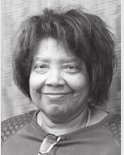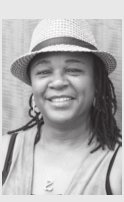“The roads are really crappy,” declared Linda Appling, president of the Lansing Eaton Neighborhood Association. “The corridor roads, they are just impassable.”
Appling is not alone in that view, but Lansing’s mayoral candidates don’t appear to have a concrete plan to address the ongoing crisis of the city’s crumbling infrastructure.
Roads are just one of the key issues eight leaders from seven neighborhood groups identified earlier this month in a focus group with City Pulse. The meeting was led by Mitch Crank, a local professional facilitator. The purpose: to identify the issues candidates need to address from the bottom up as the Aug. 8 primary election for mayor and half of the City Council approaches.
When Lansing Mayor Virg Bernero leave office Jan. 1 after 12 years, his successor will face a series of issues. Key among them, in the view of neighborhood leaders: fixing roads, effectively harnessing neighborhoods and parks to build community and unleashing the city’s code compliance to bring more of the city’s aging housing stock and empty commercial areas up to code.
Addressing the city’s issues will be a tall order for a new mayor and at least two new City Council members. They are problems Bernero and the Council have struggled to address for years while trying to maintain a balanced budget in the face of the Great Recession. The recession, combined with more than a decade and half of gutted state revenue sharing, left city coffers near empty, requiring Sophie’s choices over which city priorities got funded and by how much.
The hour and half discussion in the boardroom of Lansing Community College laid bare a sense that the city itself was not on the right path, while generally the neighborhoods were coming together and building cohesive communities.
Leaders made clear the state of the city’s roads was the overwhelming issue.

LINDA APPLING Lansing Eaton Neighborhood Association
“The roads are really crappy.”

NANCY PARSONS Mahlow Eastside Neighborhood Organization “[Code Compliance] should never have been put under the fire department.”

MELISSA JEFFRIES Coachlight Commons “Coachlight Commons is an area that I feel that has been left behind.”

PATTY FARHAT Lewton Rich Neighborhood Association
“I love our code compliance and the people that work there work really hard, but they need more people.”

CYNTHIA LOCKINGTON “Sycamore Park Neighborhood Association
“It’s like a war zone”

EMILY BERQUIST Westside Neighborhood Association
“Why are we going to sell our parks?”

TRACY PICKERING Downtown Neighborhood Association
“Community relationships are built in communal spaces.”

ROCK HUDSON Downtown Neighborhood Association
Marijuana regulations “will probably turn out to be like liquor where the state decides how many licenses you get.”
Road woes “The streets need to be repaired,” said Appling.
She represents an area of the city west of Waverly Road snuggled just inside Eaton County but still in the city boundaries.
That observation matches concerns expressed by voters in a poll by the Lansing Regional Chamber of Commerce in March. Sixty percent of voters said the priority issue was fixing Lansing’s infrastructure. It was the number one concern of voters, topping issues like jobs and the economy, neighborhoods and marijuana.
City records also show over 62 percent of the roads are considered poor as rated using the Pavement Surface Evaluation and Rating — PASER — system. That’s 258.57 miles of Lansing roads in that condition. Only 30.51 miles, or just over 7 percent, of the city’s roads are rated good under the system.
But replacing roads is expensive. It costs approximately $1 million a mile to fully replace a road. Resurfacing Michigan Avenue from Pennsylvania to U.S. 127 last year cost $300,000 — but that’s only a temporary fix to smooth the bumpy ride the pothole-ridden stretch had become.
Bernero has proposed an additional 1 mill property tax levy to finance road and sidewalk repair — that will bring in an additional $1.8 million a year. That’s on top of a 1 mill levy renewed by voters last year. But despite assurances that money would be used for fire and safety as well as roads, the Bernero administration has dipped into the fund to finance basic road upkeep like snow plowing, street sweeping and pothole patching.
On a state level, the Legislature and Gov. Rick Snyder have approved new gas taxes to fund road improvements, but the vast majority of that cash won’t be available until 2021, leaving municipalities like Lansing struggling.
Councilwoman Judi Brown Clarke, who is running for mayor, said, “Fixing the roads in Lansing will be one of my top priorities.”
State Rep. Andy Schor, the other leading candidate, also recognizes that roads are a priority, “We can’t fix them all in one year,” he said, “but we can identify neighborhood by neighborhood what the priorities are for those neighbors and try and fund the priorities.”
That, he said, would include showing Lansing residents which roads and sidewalks are getting fixed and at what cost.
Brown Clarke said she supports Bernero’s road millage, while Schor said he would leave it up to the voters to decide.
But the reality is, the city doesn’t have — and won’t have — the cash necessary to fix the roads properly, Brown Clark noted.
“Due to the inadequate level of state infrastructure funding, our engineering assessment estimated that it will cost more than $25 million to restore our neighborhood sidewalks, and an additional $211 million to restore city streets just to an average condition,” she said.
Neither candidate has a clear plan to raise $236 million for sidewalk and road improvements. The entire 2017- 2018 budget is $207.6 million.
A change in style Leaders also said they wanted a new style of leadership after 12 years of “America’s Angriest Mayor.” Bernero’s my-wayor-the-highway style combined with his name calling have rankled some in the city and neighboring communities.
“I think different times call for different kinds of leadership,” said Tracey Pickering from the Downtown Neighborhood Association. “I think where Lansing was when Virg Bernero became mayor and what he guided the city through, we probably needed somebody like that. Somebody who was going to take some punches and give a lot out to get us through tough times. But that’s not, maybe, the kind of leadership we need going forward.”
So how would Schor or Brown Clarke differ from Bernero’s tough talking, sometimes profanity -laced leadership style?
“Since the current Council members are my colleagues, I already have relationships with each and look forward to continuing to work positively with them,” Brown Clarke said, answering questions in writing. “While there will be times of disagreement, it will always be about the issues and not personal attacks. This protects the integrity and sustainability of the mayor-Council relationship.”
None of the current members of the Council has endorsed her candidacy for mayor.
Schor responded: “My leadership style, which has been shown in the House of Representatives, on the county commission, is someone who works with others.
It’s someone who brings everyone together and tries to build consensus.”
If consensus can’t be reached, he said he will “move forward with what is best for the city.”
“We’re going to work with Council to do what’s best for the city,” he said.
Schor has been endorsed by the entire Ingham County Commission, including the three Republicans, as well as former colleagues in that body. State Sen. Rick Jones, a Republican lawmaker who represents a small part of Lansing, has also endorsed Schor.
Pot? What pot?
While the Lansing City Council has spent over a year and hundreds of hours of public meetings trying to find a way to regulate Lansing’s medical marijuana industry, neighborhood leaders said the issue was not near the top of their agenda of issues.
“I think it’s going to be dealt with by the state, like liquor,” said Rock Hudson of the Downtown Neighborhood Association.
New state regulations will allow much larger grow operations, dispensaries, processing facilities and secure transportation operations, as well as testing facilities. Those are expected to come online in December, clearing the path to state licensing for such facilities.
But while state laws and rules will certainly play a role in the issuance of state licenses, the new laws also require that local municipalities approve of the locations for state licensed facilities.
In grappling with how to regulate dispensaries in Lansing, where they have proliferated despite still being illegal, the Public Safety Committee has proposed regulations heavy on zoning restrictions but with no specific cap on how many dispensaries. A City Pulse survey, though, found that of 62 dispensaries, 54 would be put out of business under the committee’s proposed ordinance.
Brown Clarke has introduced her own ordinance that would loosen some of the committee’s proposed zoning restrictions — like eliminating the distance requirement between facilities — while capping the number of dispensaries to 25 citywide. Under her plan, 15 would be approved the first year, and another 10 the following year. If more businesses qualify for a local license than available licenses, a drawing would be held to determine which businesses recieve them.
On Monday, the City Council endorsed her proposal to create a commission to review licensing applications and appeals by inserting it in the committee’s proposed ordinance. The new body would include seven Lansing residents, despite Brown Clarke’s original proposal that it include individuals from the region.
Schor, for his part, cast a vote in favor of the new state legislation. He has been coy with his opinion on the Council debates over regulating the industry, saying only that he will look at the status of the legislation if he is elected.
Codes and parks In discussing improving neighborhoods, the leaders felt two key issues were important: code compliance and neighborhood parks. The parks, Pickering noted, serve as a place for the neighbors to come together and meet each other. But Melissa Jeffries, president of Coachlight Commons, differed on this.
For her neighborhood, a stretch of Graves Park with toys on one end and basketball courts on the other is a lure for drug use, she said. In frustration, Jeffries said she would be OK with the city selling the park.
But the rest of the leaders opposed such an idea, noting that parks are key to the infrastructure that brings wellness to a community.
Brown Clarke said she would not favor selling any of the city’s 114 parks, but she noted the city’s long-term debt obligation may necessitate it.
“It’s got to be parks that activate the community,” Schor said. “I think we can do that.”
He said neighbors want positive recreation options in the parks, not “places where shady things happen.”
But shady things are not just happening in the local parks. Leaders spoke at length about issues with code compliance. Specifically, the leaders indicated there were not enough compliance officers available to police the residential and commercial sites in the city.
”So you’re in your home that you’ve paid all this money for, this is the biggest investment that you’ve ever made,” noted Patty Farhat, president of the Lewton Rich Neighborhood Association. “And you got junkie neighbors that don’t mow, park on the grass, have crap on their porch, have garbage all over the place . … I mean it’s disgusting.”
The impact of that, she said, was declining property values.
Emily Berquist, of the Westside Neighborhood Association, noted that the lack of enforcement also impacted the many commercial zones bordering the historic neighborhood where she lives.
Brown Clarke argued that city officials have said they have all the staff they need to carry out property inspections throughout the city. That’s nine employees. She also noted that since the office of code compliance was moved under the authority of the fire department, firefighters now have the capacity to issue premises and code violations as well.
“It is important to recognize that Code Compliance has only been fully staffed for less than one year; therefore, it is difficult for me, or anyone else, to know if additional code officers are needed,” she said. “I believe the neighborhood leaders are absolutely correct on the limitations caused by the code officer’s current work schedules, particularly with overnight parking enforcement.”
She said she would work with parking as well as code compliance to put staff on 24 hours a day.
“Code compliance is hugely important,” Schor said. He noted city officials “went through a fight” over staffing two years ago. He said he would need to review the operations of the department and staffing levels to make sure things are working effectively.
“The perception I get from the residents is that it’s not as effective and efficient as it could be,” Schor said.
Support City Pulse - Donate Today!
Comments
No comments on this item Please log in to comment by clicking here